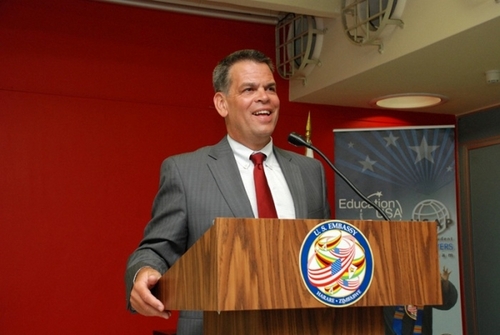By Byron Mutingwende and Watmore Makokoba
The economic decline and the subsequent consequences that manifested in the form of the infamous hyperinflation and a steep fall in standards of living for the majority of Zimbabweans has been attributed to in-house mismanagement and wanton decision making.

US Ambassador to Zimbabwe Bruce Wharton said that the problems Zimbabwe is facing have nothing to do with the so called “sanctions”, a position that his government has always maintained.
“Zimbabwe’s economy is in the hands of Zimbabweans. While businesses, labour unions, trade associations, courts and schools all have important roles, economic destiny starts with decisions made by the Government of Zimbabwe.
“Zimbabwe’s economy has been through dramatic ups and downs in the last 15 years. You all know that better than I do. But the idea that targeted U.S. sanctions have caused Zimbabwe’s economic woes simply does not hold up to critical analysis,” Mr Wharton said.
Speaking at the SAPES Trust Policy Dialogue session held in Harare recently, where he discussed U.S. policy on Zimbabwe after the July 31st 2013 elections, Mr Wharton ascertained that the Zimbabwean economy is in the hands of Zimbabweans and spoke in clear terms that the United States wanted Zimbabwe to prosper.
These calls come amid repeated pronunciations by the Zanu PF party that the economic challenges that have gripped the country for about 15 years emanate from embargoes imposed by western powers in protest at the land reform programme with a view of effecting regime.
Addressing delegates at the 68th session of UN General Assembly, President Mugabe condemned sanctions as a violation to the United Nations Charter on state sovereignty and blamed them for causing suffering to Zimbabweans.
“Zimbabwe strongly condemns the use of unilateral economic sanctions as a foreign policy tool to effect regime change. Thus, the illegal economic sanctions imposed on Zimbabwe by the United States and the European Union violates fundamental principles of the United Nations Charter on state sovereignty and non-interference in the domestic affairs of a sovereign state.
“Moreover, these illegal sanctions continue to inflict economic deprivation and human suffering on all Zimbabweans. In the eyes of our people, the sanctions constitute a form of hostility and violence against them for the simple crime of undertaking the land reform programme by which land was put in the hands of the then majority landless Zimbabweans, “said President Mugabe.
Meanwhile, Tendai Biti, the former finance minister and the MDC T Secretary General condemned nationalism for the state of affairs in the country. Biti told Nehanda Radio that even though restrictions were waived on top officials Zanu (PF) officials, the country continues to face economic challenges.
“The truth of the matter is that nationalism has failed the citizenry. Nationalism alone has betrayed us. We are going nowhere as a country because we have nowhere to go leaders. Not in a spatial geographical sense (after all travel bans have been lifted) but in a cerebral, conscientious, principled, value based projection,” Biti said.
The report released by the largest labour representative body in the country, the ZCTU shows that 9 617 jobs were lost in 2013 whilst 75 companies have shut down. Furthermore, in 2014 already 810 jobs are said to have been lost whilst capacity utilization is reported to be falling to 39.6 %.
Mr Wharton further added that The US government has remained one of the largest aid providers in Zimbabwe.
The US pledged over $130 million for improvement of the health sector, agricultural development, humanitarian assistance, and support for democratic institutions, rule of law and human rights. Wharton said his country remains committed to supporting Zimbabwe.






